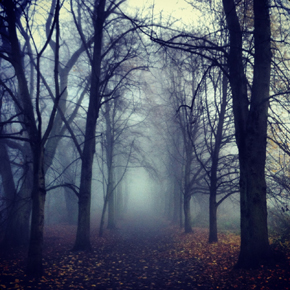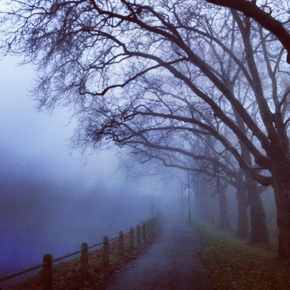The wandering shop
by John Owen Theobald
Whirly Pop lollipop (detail). Evan Amos/Wikimedia Commons
“Where did you get that?”
Billy shrugs. “Shop.”
He continues to suck on a rainbow lollipop, exposing new bizarrely coloured layers with each slurp – a Russian doll of illicit sugar. Laura has somehow failed to notice that her son departed for his weekend outdoor time with a low-sugar, high-fibre apple and returned with a vibrant glucose cyclone.
“The Sweet Shop?” I ask dubiously. “And how did you pay for it?”
Last week Billy turned 8, and on the morning of his birthday, before he even opened a present or took a bite of his French toast, he announced that he would now require pocket money, to which Laura laughed and to which I could do nothing but frown. If our refusal has resulted in Billy allotting his own ‘pocket money’ from the change jar, Billy will be spending an electronics-free Sunday up in his room.
Billy goes on slurping, revealing an electric blue.
“Shop doesn’t take money.”
Now even Laura, hitherto blithely putting away the dishes, joins the discussion.
“What do you mean, honey? They let you have it as a present?”
Billy shakes his head, ruffled hair spinning. He may be enjoying an extended cute phase – Neil across the street also turned 8, and already he looks like an aspiring builder – but no one is gifting him with treats for it.
I finger the change in my pocket, preparing an apology and explanation. Our son is at that age, blah, blah. Property rights, blah blah. A quick stop on the way to the gym shouldn’t take more than a minute or two.
“Which shop is it, Billy?”
“A new shop, down past the ponds. On the Heath.”
I stop cold. “On the Heath? See, Laura. I told you – what good is the council if they can’t stop…”
“Where exactly, dear?” she asks smoothly.
Billy shrugs. “Past the ponds. Down a muddy path. Lots of trees.”
“Someone gave this to you in the woods?” Laura’s tone shifts. “Give me the candy, honey.”
The lollipop is almost gone, proclaiming its inner self, a blazing bright yellow.
I shake my head. “Don’t be silly. Look, it has a wrapper. What kind of drug dealer wraps…”
Still, the candy, dangerously close to emitting its own light source, begins to look a little suspect. I reach out and remove it from sticky hands. There is no fuss, just another shrug, and Billy steps down from the chair and wanders happily off.
Shielding my eyes against the glow, I read the small emblem on the peeled-back wrapper: The Wandering Shop.
“A hipster thing?” Laura asks.
“What?”
“You know, all those ‘pop-up’ shops that sell sculpture or hot dogs and then disappear again.”
I nod. A pop-up candy shop? In the middle of the woods? Run by two earnest philosophy students with lumberjack beards and too-tight jeans? It doesn’t seem impossible.
“We’ll sort it out after, okay?”
I kiss Laura goodbye and hurry out the door.
Racing down the street, I glance at my watch. 10:26. Is it fast, or merely acting up again? The sole function of a watch, and it’s unreliable. No wonder it’s soon to be obsolete, a weird vintage item found alongside those accordion cameras on Portobello Road.
Either way, I’m going to be late. It’s such a pain to set up all the equipment – carrying over the different weights, adjusting the bench. Today is meant to be a new instructor, too, so no grace period even for the regulars.
I am walking now, and realise that I have already made my choice. Outdoor walking is good for the body and the mind, better than exercising in some fluorescent-lit room next to a phalanx of yummy mummies, and though it looks inescapable, it is not yet raining. I turn a sharp left, heading for the Heath entrance nearest the ponds.

Hampstead Heath woods © John Owen Theobald
Most of the trails are muddy, the wet earth trampled by the endless parade of wellies and prams. Today though it is quiet, only the occasional jogger or dog walker. I pick up the pace, skirting the avoidable puddles. It has been some time since I walked on the Heath, not as a cut-through to Highgate or South End Green, but for its own sake. The hardy, winter-facing birds are here – fluting robins, fat and happy, and chirping blue-tits, blue capped and yellow bellied. The ever-present, ever-chattering magpies.
The swimming ponds, too, are empty. Too cold for even the sturdiest drunk teenagers. Only swans, turning lazy circles, undisturbed by what the waters beneath must hold. When we first moved here, Laura and I braved the frigid waters and cannonballers.
The wind jumps and I hurry up the abrupt hill, my knees creaking in mild complaint. A flash of green – a woodpecker? – and from somewhere comes the distant screech of a chainsaw. And, of course, the insistent knock of hammers. Another slice of nature lost to the city. Why do planning laws not apply to the super-rich? The poetry of earth is never dead, indeed. A light rain begins to fall just as I reach the summit.
And there it is. Tucked discreetly among the bursting green cedars, a shop. Larger than I would have thought possible. The walls obviously fold up, though the wood looks thick – there must be a vehicle – a 4-wheeler, a small car? – that tows the thing away. None of that is in evidence, though. There is, however, quite distinctly, a man standing behind a counter.
Not the earnest young creative type I had envisioned, but nor is this some doubled-up old crone from Grimm. It is, in fact, a very regular – if a bit stiff-looking – shop assistant. Maybe 40, tall and quite handsome, blond hair, nice black pea coat.
Seeing me approach, he inclines his head. I offer an open hand as a wave.
What is the game here? What could possibly be the point of this? Certainly it is illegal to set up… whatever this is… in the middle of public land.”
There is a wooden counter – solid pine – and behind that this normal-seeming man and his ludicrous assortment of candy. And toys, as I look closer. Books, too, on the high shelves – and in a holder by his feet an umbrella stand, with some admittedly beautiful wooden umbrellas.
“What are you after today, sir?”
I stare up at the man. What is the game here? What could possibly be the point of this – of going to all this trouble? Certainly it is illegal to set up… whatever this is… in the middle of public land. I see watches, too, obviously fake but at least good replicas.
“How much?”
His face does not change. Some kind of avant-garde theatre, perhaps? Where I am the audience but also the cast and the reviewer? An immersive, one-on-one show among the dirt and pigeons and rain? A psychology experiment? The man does not look threatening, but nor does he look like a theatre buff or a scientist.

Hampstead Ponds © John Owen Theobald
“No cost, sir.”
“Free?”
He nods gamely.
I hold his eyes. Whatever this is, it’s about to stop.
“I’ll take it all.”
“All of it, sir?”
“All of it.”
He nods. Without another word he begins wrapping the candies, two or three in each brown bag, stacking them on the counter. I observe, not stepping back, not looking away. On you go. I’m not going to break first, pal.
He begins on the watches. Then the umbrellas, which look to be polished chestnut – a single piece of wood, hand-crafted, plated gold collar, silk canopy. His hands move slowly, expertly.
I inch forward, putting myself firmly under the shop’s roof. The man continues wrapping and stacking, his face expressionless.
“I mean… what is this?” I finally ask. “Is it… black market?”
He smiles. Immediately I feel like a fool.
“Of course not, sir. All perfectly legal.”
“All of this… legal?”
Again he nods.
“It’s all mine.”
I nod back. Maybe some sort of socialist thing, where they really want me to take everything? A Robin Hood-themed outlet store? Spread the wealth to the community? We are in the woods, after all. Or is this an Ayn Rand experiment, where the valuable goods go to those willing to claim them? Did I pick the right answer – the first person to solve the riddle and therefore the rightful owner of all these goods? No, this is crazy. What if it is stolen? Some of this stuff – the umbrellas, the coats – could be traced back to the original owners.
The man is now folding the coats in unhurried, elegant gestures. The stack, though, is beginning to look absurd. How could I even bring it all home?
The rain is picking up as the man keeps folding and stacking, a series of leather books emerging alongside the coats. A pigeon claps out of a distant tree.
“You know what?” I lean in. “Don’t worry about it. I can take care of it.”
He pauses. “Sir?”
“You shouldn’t have to pack this all up for me. I don’t know what the rules are or whatever. But it’s too much for you to help. Just leave it here, and I’ll find a way to get it all home.”
“Are you sure, sir?’
‘Yes, yes. You’ve done enough, thank you. You have been most helpful. But you don’t need to do all this. I can take it from here.”
The man nods, as accommodating as ever. I can see, just behind him, another stack of books. I can pile the others on top of that, keep everything orderly, out of the wet.
“Thank you, again. I can’t believe it. I mean, I can, I do – it’s just… Oh, here, wait – take an umbrella at least. Here, one of the nice ones.”
But the man just shakes his head, turning up his collar against the rain.
“It’s yours now, sir.”
“Are you sure? Okay, well thank you again. Such a wonderful surprise, truly.”
The man steps out of the store as I step in, and as I begin to arrange the new volumes on top of the old, his departing words echo loudly in my ears.
 John Owen Theobald was born and raised in eastern Canada, moved to the UK to study the poetry of Keats, and in 2009 received a PhD from the University of St Andrews. Facing Up to War, his collection of essays on the literature of war, is published in spring 2014. He now lives in London.
John Owen Theobald was born and raised in eastern Canada, moved to the UK to study the poetry of Keats, and in 2009 received a PhD from the University of St Andrews. Facing Up to War, his collection of essays on the literature of war, is published in spring 2014. He now lives in London.
www.johnowentheobald.com

